社会实践在教育中的作用英语作文
- 格式:doc
- 大小:24.50 KB
- 文档页数:2
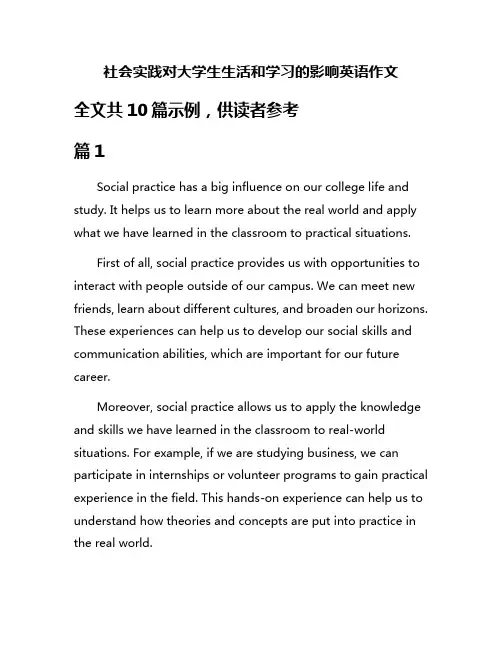
社会实践对大学生生活和学习的影响英语作文全文共10篇示例,供读者参考篇1Social practice has a big influence on our college life and study. It helps us to learn more about the real world and apply what we have learned in the classroom to practical situations.First of all, social practice provides us with opportunities to interact with people outside of our campus. We can meet new friends, learn about different cultures, and broaden our horizons. These experiences can help us to develop our social skills and communication abilities, which are important for our future career.Moreover, social practice allows us to apply the knowledge and skills we have learned in the classroom to real-world situations. For example, if we are studying business, we can participate in internships or volunteer programs to gain practical experience in the field. This hands-on experience can help us to understand how theories and concepts are put into practice in the real world.Additionally, social practice can help us to discover our interests and passions. When we participate in different activities or projects, we may find that we are passionate about certain issues or topics. This can help us to choose a career path that aligns with our interests and values.In conclusion, social practice plays a vital role in shaping our college life and study. It helps us to develop social skills, apply our knowledge to practical situations, and discover our passions. By actively participating in social practice activities, we can make the most of our college experience and prepare ourselves for a successful future.篇2Social practice has a great impact on college students' life and study. When we go out to practice in society, we have the opportunity to learn new knowledge and skills that cannot be learned in the classroom. It helps us to broaden our horizons and gain practical experience.First of all, social practice can cultivate our ability to adapt to society. In the process of practice, we need to communicate with different people, solve problems independently, and cooperate with teammates. These experiences help us to improve our socialskills and interpersonal relationships. We learn how to deal with difficulties and challenges, which is beneficial for our future career development.Secondly, social practice enables us to apply what we have learned in the classroom to real-life situations. The knowledge we learn in school is theoretical, but through social practice, we can put it into practice and see the results. It helps us to deepen our understanding of the subjects we study and enhances our learning motivation.Moreover, social practice allows us to discover our interests and strengths. By participating in different activities and projects, we have the opportunity to explore various fields and find out what we are passionate about. This can help us to make better career choices in the future.In conclusion, social practice has a positive impact on college students' life and study. It not only helps us to acquire practical skills and knowledge but also cultivates our social adaptability and personal growth. Therefore, college students should actively participate in social practice activities to enrich their college life and improve their learning outcomes.篇3Social practice has a big impact on our college life and study. It's like a superpower that can help us grow and become better students and individuals.First of all, social practice gives us a chance to apply what we have learned in class to real-life situations. For example, if we are studying engineering, we can work on a project that involves building something or fixing something. This hands-on experience helps us understand the concepts better and remember them for a longer time.Secondly, social practice helps us develop important skills like teamwork, communication, and problem-solving. When we work on a project with other people, we have to learn how to cooperate with them, listen to their ideas, and come up with solutions together. These skills are not only important for our studies but also for our future careers.Moreover, social practice exposes us to different cultures, perspectives, and challenges. When we interact with people from diverse backgrounds, we learn to appreciate their differences and see the world from their point of view. This broadens our horizons and makes us more open-minded and tolerant.In conclusion, social practice is a valuable part of our college experience. It helps us apply what we have learned, developimportant skills, and broaden our horizons. So let's embrace every opportunity for social practice and make the most of it!篇4Social practice has a huge impact on our university life and study. As a big kid in college, it's super important to get out of the campus and experience the real world through social practice.First of all, social practice can help us gain practical skills that we can't learn in the classroom. For example, when we participate in volunteer work, we can develop teamwork skills and communication skills. These skills are super important in our future careers, so social practice is like a training ground for us to become awesome professionals.Secondly, social practice can broaden our horizons and make us more open-minded. When we visit different communities or countries during social practice, we can learn about different cultures and ways of life. This can help us become more understanding and tolerant of others, which is a super cool thing to have in today's diverse world.Moreover, social practice can also help us build connections and networks. When we interact with people from differentbackgrounds during social practice, we can make friends and contacts that may be super helpful in the future. These connections can open up new opportunities for us and help us grow in ways we never imagined.In conclusion, social practice is like a super power-up for us big kids in college. It helps us develop practical skills, become more open-minded, and build connections that can benefit us in the future. So let's not miss out on the awesome opportunities that social practice can bring to our university life and study. Let's go out there and make a difference!篇5Hey guys, have you ever thought about how social practice can affect our lives and studies as college students? Well, let me tell you all about it!First of all, social practice is super important for us because it helps us to apply what we learn in the classroom to the real world. For example, when we participate in community service projects or internships, we get to see how our knowledge and skills can make a difference in the world. This practical experience can really help us to understand our subjects better and develop a deeper understanding of the world around us.Moreover, social practice can also help us to develop important skills that will benefit us in the future. When we work in teams, communicate with different people, and solvereal-world problems, we are building our teamwork, communication, and problem-solving skills. These skills are not only important for our studies but also for our future careers. Employers love to see that we have practical experience and strong skills, so social practice can really give us a competitive edge in the job market.In addition, social practice allows us to explore different fields and interests that we may not have considered before. By volunteering, interning, or participating in social events, we can discover new passions, meet new people, and broaden our horizons. This can help us to figure out what we are truly passionate about and what we want to pursue in the future.Overall, social practice is an essential part of our college experience. It not only enhances our learning and skills but also enriches our lives and helps us to grow as individuals. So, let's all make the most of every social practice opportunity that comes our way and see how it can positively impact our lives and studies as college students!篇6Hi everyone! Today I want to talk about how social practice can influence the life and study of college students. Social practice is when we go out into the community and learn about real life situations. It can be volunteering, internships, or even just talking to people outside of campus.First of all, social practice can help us apply what we learn in the classroom to real life situations. Sometimes it's hard to see how our studies relate to the world outside of school. But when we go out and work with people in need, or see how businesses operate, we can see the practical applications of our knowledge. For example, if we study business, we can see firsthand how marketing strategies are implemented in a real company.Secondly, social practice can help us develop important life skills. When we work with others in the community, we learn how to communicate effectively, problem solve, and work as a team. These skills are important not only for our future careers, but also for our personal relationships and overall success in life.Additionally, social practice can broaden our perspective and help us understand different cultures and social issues. By interacting with people from diverse backgrounds, we can gain empathy and a deeper understanding of the world around us.This can make us more open-minded and compassionate individuals.In conclusion, social practice is an important part of our college experience. It can enrich our academic learning, develop essential life skills, and expand our worldview. So let's take advantage of opportunities to engage with the community and make a positive impact on the world around us! Thank you for listening!篇7Social practice plays an important role in influencing the life and study of college students. It provides practical experience and opportunities for students to apply what they have learned in the classroom to real-world situations. Here are some ways in which social practice impacts college students' lives and studies.Firstly, social practice allows college students to gain hands-on experience in their field of study. For example, a student majoring in journalism may have the opportunity to intern at a news organization, where they can observe and participate in the day-to-day operations of a newsroom. This practical experience helps students to better understand theconcepts and theories they learn in class and prepares them for future career opportunities.Secondly, social practice helps college students develop important skills such as communication, teamwork, and problem-solving. Working on projects with a diverse group of people in a real-world setting allows students to practice and improve their communication skills. They learn how to work effectively as a team, negotiate with others, and solve problems creatively.Furthermore, social practice expands college students' perspectives and awareness of social issues. Through volunteering, internships, or study abroad programs, students are exposed to different cultures, lifestyles, and ways of thinking. This broadens their understanding of the world and helps them become more empathetic and tolerant individuals.In addition, social practice can also lead to networking opportunities and future career prospects for college students. By building relationships with professionals in their field through internships or volunteer work, students can gain valuable connections that may lead to job offers or mentorship opportunities.Overall, social practice has a significant impact on college students' lives and studies. It provides practical experience, helps develop important skills, expands perspectives, and creates networking opportunities. College students who actively engage in social practice are better equipped to succeed in their academic pursuits and future careers.篇8Social practice is super important for college students' life and study. It can have a big impact on us in many ways.First of all, social practice can help us gain practical experience. We can apply what we have learned in class toreal-life situations and solve problems. For example, when we participate in volunteer activities, we can learn how to communicate with different people, work as a team, and adapt to changes quickly.Secondly, social practice can enrich our knowledge and broaden our horizons. By taking part in various social activities, we can learn about different cultures, traditions, and societal issues. This can help us develop a better understanding of the world and become more tolerant and open-minded individuals.Moreover, social practice can improve our interpersonal skills. By interacting with people from diverse backgrounds, we can learn how to communicate effectively, negotiate conflicts, and build strong relationships. These skills are essential for both our personal and professional life.In addition, social practice can boost our confidence and self-esteem. When we successfully complete a social project or help others in need, we feel a sense of accomplishment and pride. This can motivate us to strive for excellence in all areas of our life.Overall, social practice plays a significant role in shaping our character, enhancing our skills, and preparing us for the challenges of the future. So, let's actively participate in social activities and make the most of this valuable learning opportunity!篇9Yo guys! Today I wanna talk about how social practice can totally change a college student's life and studies. It's like super important, so listen up!First off, social practice helps us understand what's really going on outside of our campus bubble. It's like stepping into the real world and seeing how things work. We get to meet different people, learn about new cultures, and see firsthand the issues that communities face. This can totally broaden our minds and give us a different perspective on life.Secondly, social practice can improve our skills and knowledge. By getting hands-on experience, we can apply what we've learned in class to real-life situations. We can also develop important skills like communication, teamwork, andproblem-solving. Plus, we can learn new things that we wouldn't have known otherwise. It's like leveling up in a video game!And let's not forget about the impact social practice can have on our future careers. When we participate in volunteer work, internships, or research projects, we're not only gaining experience but also building our network. We can make connections with professionals in our field, which can open up opportunities for jobs or further education down the road.But most importantly, social practice can teach us about empathy and compassion. When we interact with people who are less fortunate or struggling, it can remind us to be gratefulfor what we have and to lend a helping hand to those in need. It can make us more caring and understanding individuals.So, guys, social practice is like a superpower that can transform our lives and studies for the better. It's not just about getting good grades or landing a job – it's about growing as a person and making a positive impact on the world. So let's get out there, get involved, and make a difference!篇10Social practice is super fun and can have a big impact on our lives as college students! Let me tell you all about it!First of all, when we go out into the community and do social practice, we get to meet so many cool people. We can talk to them, learn from them, and make new friends. It's awesome to connect with others and see how they live their lives. This can really open our eyes and make us more understanding and accepting of different cultures and ways of life.Not only that, but social practice can also help us learn new skills. For example, we might volunteer at a hospital and learn how to take care of patients. Or we might help out at a school and learn how to teach kids. These experiences can be reallyvaluable and can even help us figure out what we want to do in the future.Plus, social practice can also make us feel good about ourselves. When we help others and make a positive impact in the community, it gives us a sense of pride and accomplishment. It can boost our confidence and make us feel like we're making a difference in the world.So, as you can see, social practice is not only super fun, but it can also have a big impact on our lives as college students. It can help us make new friends, learn new skills, and feel good about ourselves. So let's get out there and start making a difference!。
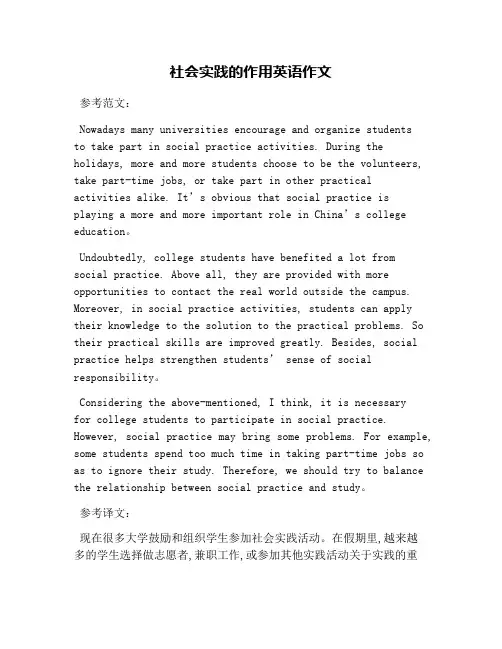
社会实践的作用英语作文参考范文:Nowadays many universities encourage and organize studentsto take part in social practice activities. During the holidays, more and more students choose to be the volunteers, take part-time jobs, or take part in other practicalactivities alike. It’s obv ious that social practice isplaying a more and more important role in China’s college education。
Undoubtedly, college students have benefited a lot fromsocial practice. Above all, they are provided with more opportunities to contact the real world outside the campus. Moreover, in social practice activities, students can apply their knowledge to the solution to the practical problems. So their practical skills are improved greatly. Besides, social practice helps strengthen students’ sense of social responsibility。
Considering the above-mentioned, I think, it is necessaryfor college students to participate in social practice. However, social practice may bring some problems. For example, some students spend too much time in taking part-time jobs so as to ignore their study. Therefore, we should try to balance the relationship between social practice and study。
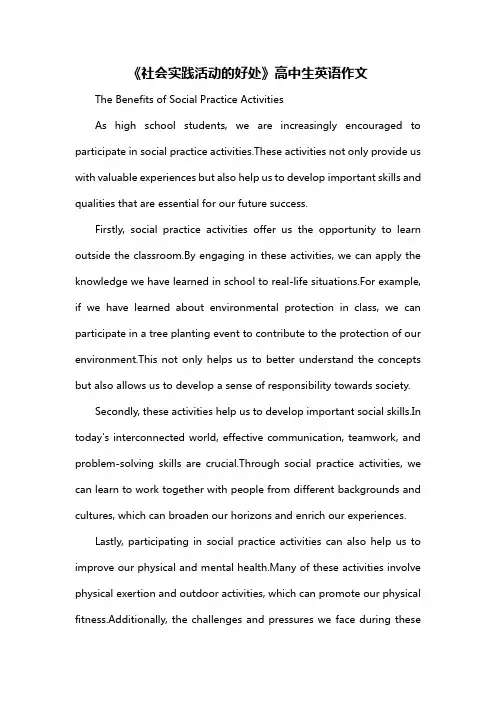
★以下是英文写作翻译频道为大家整理的《实践的好处英语作文带翻译》,供大家参考。
更多内容请看本站频道。
1. 学生往往对社会现实缺乏认识。
2. 社会实践是学校教育的一个重要组成部分。
3. 参加社会实践的好处。
It is a common weak point among today's college students that the majority of them have little knowledge of social reality. Social practice is a bridge between their theory and reality. Timely participation in social practice will benefit them all through their life.Social practice must become an organic component of the nation's higher education. If so, students are sure to learn more than their textbooks. Their participation in social practice and knowledge of society they learn and national conditions might strengthen their sense of social responsibility; their close contact with the working people might help them to apply their knowledge to the solution to the practical problem.In recent years. many college students have been sent to the basic level to keep in contact with workers and farmers. The process has proved effective in enriching their knowledge of reality.社会实践在教育中的作用如今大学生的共同弱点是大多数大学生对社会现实缺乏认识。
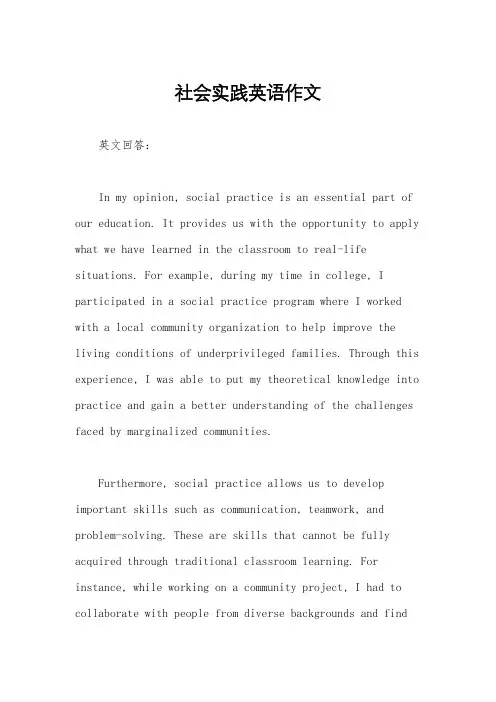
社会实践英语作文英文回答:In my opinion, social practice is an essential part of our education. It provides us with the opportunity to apply what we have learned in the classroom to real-life situations. For example, during my time in college, I participated in a social practice program where I worked with a local community organization to help improve the living conditions of underprivileged families. Through this experience, I was able to put my theoretical knowledge into practice and gain a better understanding of the challenges faced by marginalized communities.Furthermore, social practice allows us to develop important skills such as communication, teamwork, and problem-solving. These are skills that cannot be fully acquired through traditional classroom learning. For instance, while working on a community project, I had to collaborate with people from diverse backgrounds and findcreative solutions to overcome various obstacles. This not only improved my ability to work with others but alsotaught me how to think critically and adapt to different situations.中文回答:在我看来,社会实践是我们教育的重要组成部分。
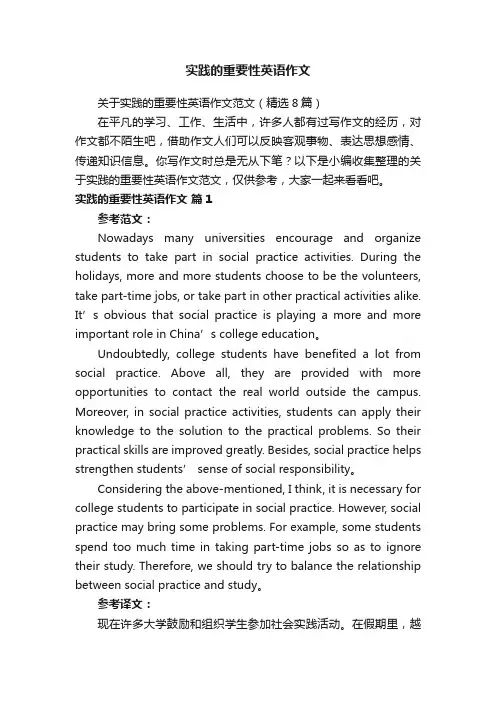
实践的重要性英语作文关于实践的重要性英语作文范文(精选8篇)在平凡的学习、工作、生活中,许多人都有过写作文的经历,对作文都不陌生吧,借助作文人们可以反映客观事物、表达思想感情、传递知识信息。
你写作文时总是无从下笔?以下是小编收集整理的关于实践的重要性英语作文范文,仅供参考,大家一起来看看吧。
实践的重要性英语作文篇1参考范文:Nowadays many universities encourage and organize students to take part in social practice activities. During the holidays, more and more students choose to be the volunteers, take part-time jobs, or take part in other practical activities alike. It’s obvious that socia l practice is playing a more and more important role in China’s college education。
Undoubtedly, college students have benefited a lot from social practice. Above all, they are provided with more opportunities to contact the real world outside the campus. Moreover, in social practice activities, students can apply their knowledge to the solution to the practical problems. So their practical skills are improved greatly. Besides, social practice helps strengthen students’ sense of social responsibility。
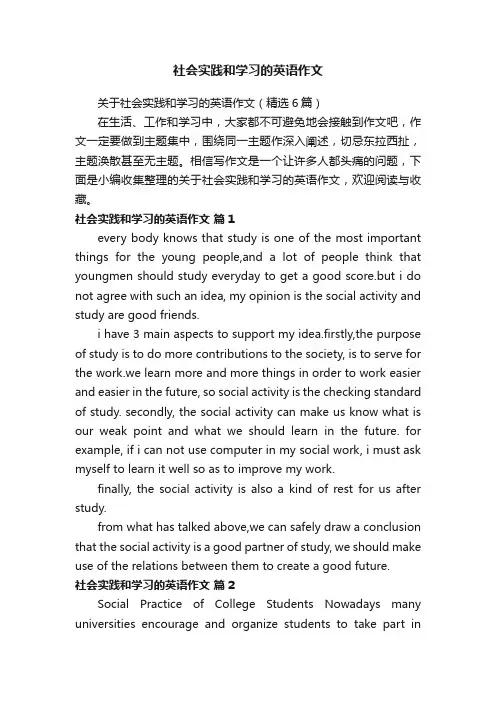
社会实践和学习的英语作文关于社会实践和学习的英语作文(精选6篇)在生活、工作和学习中,大家都不可避免地会接触到作文吧,作文一定要做到主题集中,围绕同一主题作深入阐述,切忌东拉西扯,主题涣散甚至无主题。
相信写作文是一个让许多人都头痛的问题,下面是小编收集整理的关于社会实践和学习的英语作文,欢迎阅读与收藏。
社会实践和学习的英语作文篇1every body knows that study is one of the most important things for the young people,and a lot of people think that youngmen should study everyday to get a good score.but i do not agree with such an idea, my opinion is the social activity and study are good friends.i have 3 main aspects to support my idea.firstly,the purpose of study is to do more contributions to the society, is to serve for the work.we learn more and more things in order to work easier and easier in the future, so social activity is the checking standard of study. secondly, the social activity can make us know what is our weak point and what we should learn in the future. for example, if i can not use computer in my social work, i must ask myself to learn it well so as to improve my work.finally, the social activity is also a kind of rest for us after study.from what has talked above,we can safely draw a conclusion that the social activity is a good partner of study, we should make use of the relations between them to create a good future.社会实践和学习的英语作文篇2Social Practice of College Students Nowadays many universities encourage and organize students to take part insocial practice activities.During the holidays, more and more students choose to be the volunteers, take part-time jobs, or take part in other practical activities alike. It’s obvious that social practice is playing a more and more important role in China’s college education. Undoubtedly, college students have benefited a lot from social practice. Above all, they are provided with more opportunities to contact the real world outside the campus. Moreover, in social practice activities, students can apply their knowledge to the solution to the practical problems. So their practical skills are improved greatly.Besides, social practice helps s trengthen students’ sense of social responsibility. Considering the above-mentioned, I think, it is necessary for college students to participate in social practice. However, social practice may bring some problems.For example, some students spend too much time in taking part-time jobs so as to ignore their study. Therefore, we should try to balance the relationship between social practice and study. 社会实践和学习的英语作文篇3College students need to take part in the social practice before they graduate, many universities encourage students to do it, they have some policies to support students to carry on social practice. It is obvious that social practice is very important for college students, students can gain a lot from it.大学生需要在毕业前参加社会实践,很多大学鼓励学生进行社会实践,他们有一些政策来支持学生实行它。
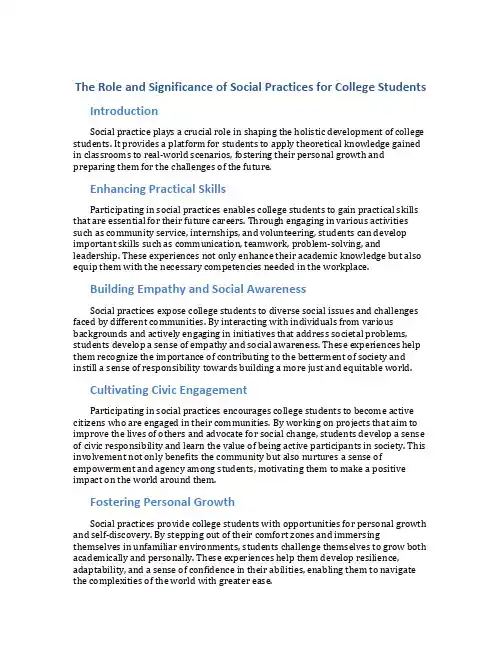
The Role and Significance of Social Practices for College Students IntroductionSocial practice plays a crucial role in shaping the holistic development of college students. It provides a platform for students to apply theoretical knowledge gained in classrooms to real-world scenarios, fostering their personal growth and preparing them for the challenges of the future.Enhancing Practical SkillsParticipating in social practices enables college students to gain practical skills that are essential for their future careers. Through engaging in various activities such as community service, internships, and volunteering, students can develop important skills such as communication, teamwork, problem-solving, and leadership. These experiences not only enhance their academic knowledge but also equip them with the necessary competencies needed in the workplace.Building Empathy and Social AwarenessSocial practices expose college students to diverse social issues and challenges faced by different communities. By interacting with individuals from various backgrounds and actively engaging in initiatives that address societal problems, students develop a sense of empathy and social awareness. These experiences help them recognize the importance of contributing to the betterment of society and instill a sense of responsibility towards building a more just and equitable world.Cultivating Civic EngagementParticipating in social practices encourages college students to become active citizens who are engaged in their communities. By working on projects that aim to improve the lives of others and advocate for social change, students develop a sense of civic responsibility and learn the value of being active participants in society. This involvement not only benefits the community but also nurtures a sense of empowerment and agency among students, motivating them to make a positive impact on the world around them.Fostering Personal GrowthSocial practices provide college students with opportunities for personal growth and self-discovery. By stepping out of their comfort zones and immersing themselves in unfamiliar environments, students challenge themselves to grow both academically and personally. These experiences help them develop resilience, adaptability, and a sense of confidence in their abilities, enabling them to navigate the complexities of the world with greater ease.ConclusionIn conclusion, social practices play a pivotal role in the development of college students by enhancing their practical skills, building empathy and social awareness, cultivating civic engagement, and fostering personal growth. These experiences not only enrich students’ academic journeys but also prepare them to become responsible, empowered citizens who are equipped to make a positive impact on society. Embracing social practices as an integral part of the college experience is essential in nurturing well-rounded individuals who are ready to tackle the challenges of the future with confidence and compassion.。
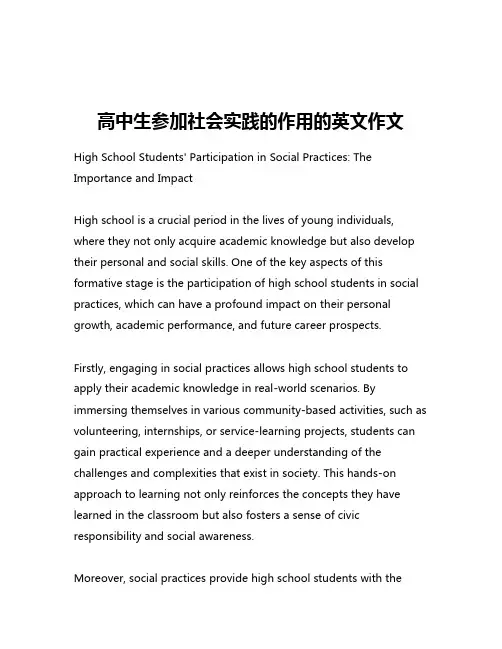
高中生参加社会实践的作用的英文作文High School Students' Participation in Social Practices: The Importance and ImpactHigh school is a crucial period in the lives of young individuals, where they not only acquire academic knowledge but also develop their personal and social skills. One of the key aspects of this formative stage is the participation of high school students in social practices, which can have a profound impact on their personal growth, academic performance, and future career prospects.Firstly, engaging in social practices allows high school students to apply their academic knowledge in real-world scenarios. By immersing themselves in various community-based activities, such as volunteering, internships, or service-learning projects, students can gain practical experience and a deeper understanding of the challenges and complexities that exist in society. This hands-on approach to learning not only reinforces the concepts they have learned in the classroom but also fosters a sense of civic responsibility and social awareness.Moreover, social practices provide high school students with theopportunity to develop essential soft skills that are highly valued in both academic and professional settings. Through these experiences, students can enhance their communication, problem-solving, teamwork, and leadership abilities. They learn to navigate diverse situations, collaborate with individuals from different backgrounds, and think critically to address real-world problems. These skills are not only beneficial for academic success but also serve as a foundation for their future careers, as employers increasingly seek candidates with strong interpersonal and problem-solving abilities.In addition to the development of practical and soft skills, participation in social practices can have a positive impact on the academic performance of high school students. When students engage in activities that are aligned with their interests and passions, they often experience increased motivation and engagement in their studies. This, in turn, can lead to improved academic outcomes, as students are more likely to apply themselves diligently to their coursework and actively seek out opportunities to expand their knowledge and skills.Furthermore, social practices can play a crucial role in the personal development of high school students. By stepping outside of their comfort zones and engaging with their local communities, students gain a deeper understanding of the world around them and develop a greater sense of empathy and social responsibility. This exposureto diverse perspectives and experiences can foster personal growth, self-awareness, and a heightened sense of civic engagement, all of which are essential for becoming well-rounded and socially conscious individuals.Another significant benefit of high school students' participation in social practices is the positive impact it can have on their future career prospects. Employers often value the practical experience and soft skills gained through these activities, as they demonstrate a candidate's ability to apply their knowledge in real-world situations and work effectively within a team. By actively engaging in social practices, high school students can gain a competitive edge in the job market, as they can showcase their diverse skill set and the valuable insights they have acquired through their community involvement.It is important to note that the benefits of social practices extend beyond the individual high school student. When students actively participate in community-based activities, they can contribute to the betterment of their local communities and foster a sense of social cohesion. By addressing the needs of their communities, students can develop a deeper understanding of the challenges faced by various groups and work towards creating positive change.In conclusion, the participation of high school students in socialpractices is a crucial aspect of their educational and personal development. Through these experiences, students can apply their academic knowledge, develop essential soft skills, enhance their academic performance, and gain a deeper understanding of the world around them. Furthermore, these activities can positively impact their future career prospects and contribute to the betterment of their local communities. Encouraging and facilitating high school students' engagement in social practices should be a priority for educators, policymakers, and community leaders, as it can lead to the holistic growth and empowerment of the next generation of leaders and change-makers.。
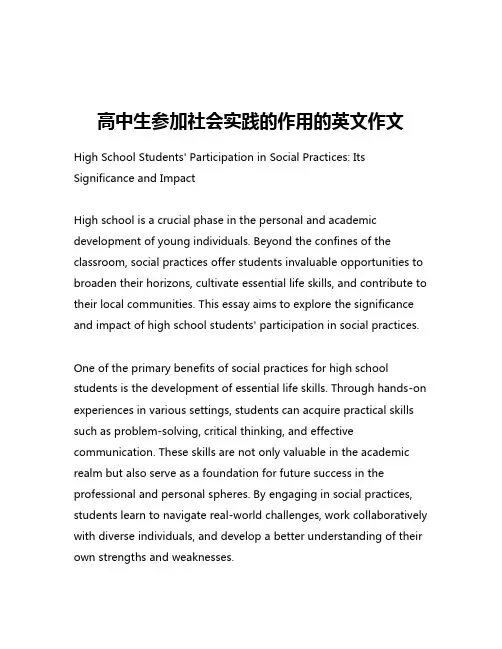
高中生参加社会实践的作用的英文作文High School Students' Participation in Social Practices: Its Significance and ImpactHigh school is a crucial phase in the personal and academic development of young individuals. Beyond the confines of the classroom, social practices offer students invaluable opportunities to broaden their horizons, cultivate essential life skills, and contribute to their local communities. This essay aims to explore the significance and impact of high school students' participation in social practices.One of the primary benefits of social practices for high school students is the development of essential life skills. Through hands-on experiences in various settings, students can acquire practical skills such as problem-solving, critical thinking, and effective communication. These skills are not only valuable in the academic realm but also serve as a foundation for future success in the professional and personal spheres. By engaging in social practices, students learn to navigate real-world challenges, work collaboratively with diverse individuals, and develop a better understanding of their own strengths and weaknesses.Moreover, social practices provide high school students with the chance to explore their interests and passions beyond the traditional curriculum. Whether it's volunteering at a local non-profit organization, participating in community service projects, or interning at a local business, these experiences allow students to discover new areas of interest and potentially identify future career paths. This exposure to diverse fields and industries can help students make more informed decisions about their academic and professional pursuits, ultimately leading to greater fulfillment and success in their future endeavors.In addition to the development of practical skills and the exploration of interests, social practices also play a crucial role in fostering a sense of civic responsibility and social awareness among high school students. By engaging with local communities and addressing real-world issues, students gain a deeper understanding of the social, economic, and environmental challenges facing their neighborhoods and the world at large. This awareness can inspire students to become active and engaged citizens, committed to making a positive difference in their communities.Furthermore, social practices can have a profound impact on the personal growth and well-being of high school students. Participating in these activities can boost self-confidence, enhance self-esteem, and promote a sense of purpose and belonging. Asstudents contribute to meaningful causes and witness the tangible impact of their efforts, they develop a greater sense of agency and empowerment. This can be particularly beneficial for students who may struggle with social or emotional challenges, as social practices provide a supportive environment for personal development and the cultivation of positive relationships.It is important to note that the benefits of social practices extend beyond the individual level. When high school students engage in these activities, they contribute to the overall well-being and development of their local communities. By volunteering their time and skills, students can address pressing issues, support vulnerable populations, and contribute to the betterment of their surroundings. This collective impact not only benefits the recipients of these services but also instills a sense of civic pride and social responsibility in the students themselves.In conclusion, the participation of high school students in social practices is a crucial component of their holistic development. These experiences foster the acquisition of essential life skills, the exploration of diverse interests, the cultivation of civic responsibility, and the promotion of personal growth and well-being. As high school students engage in these meaningful activities, they not only enrich their own lives but also make valuable contributions to their local communities and society as a whole. Encouraging andsupporting high school students' involvement in social practices should be a priority for educators, policymakers, and community leaders, as it holds the potential to shape the next generation of engaged and socially conscious citizens.。

学生社会实践活动建议英语作文In the ever-evolving academic landscape, student social practice has become an integral part of the educational experience. It offers students an opportunity to applytheir theoretical knowledge to real-world situations, thus fostering a deeper understanding and appreciation for the subjects they study. Engaging in social practice not only enhances students' academic skills but also cultivatestheir social and emotional intelligence, preparing them for the challenges of the future.**The Importance of Social Practice**Social practice provides a unique platform for students to engage with their communities and the world at large. Through participation in volunteer work, internships, community service projects, and other similar activities, students gain valuable insights into the complexities of real-world problems. This hands-on experience complements classroom learning, making abstract concepts more tangible and relevant.**Bridging Theory and Practice**One of the key benefits of social practice is itsability to bridge the gap between theory and practice. Students often find that the knowledge they acquire in the classroom is abstract and detached from real-world contexts. Social practice brings this knowledge to life, allowing students to apply it in meaningful ways. For example, students studying environmental science can participate in cleanup campaigns or conduct research on sustainable development projects. This experience not only enhancestheir understanding of environmental issues but also激励他们为保护环境做出贡献。
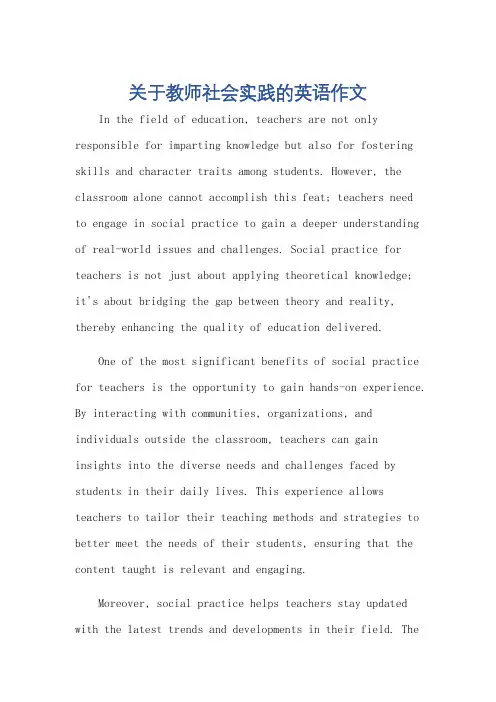
关于教师社会实践的英语作文In the field of education, teachers are not only responsible for imparting knowledge but also for fostering skills and character traits among students. However, the classroom alone cannot accomplish this feat; teachers needto engage in social practice to gain a deeper understanding of real-world issues and challenges. Social practice for teachers is not just about applying theoretical knowledge;it's about bridging the gap between theory and reality, thereby enhancing the quality of education delivered.One of the most significant benefits of social practice for teachers is the opportunity to gain hands-on experience. By interacting with communities, organizations, and individuals outside the classroom, teachers can gaininsights into the diverse needs and challenges faced by students in their daily lives. This experience allows teachers to tailor their teaching methods and strategies to better meet the needs of their students, ensuring that the content taught is relevant and engaging.Moreover, social practice helps teachers stay updated with the latest trends and developments in their field. Theconstantly evolving world requires teachers to be flexible and adaptive, able to incorporate new ideas and technologies into their teaching. Engaging in social practice allows teachers to stay connected with industry experts, researchers, and policymakers, enabling them to bring fresh perspectives and innovative practices into the classroom.Additionally, social practice fosters a sense of social responsibility among teachers. By participating in community service projects or collaborating with non-profit organizations, teachers can make a tangible difference in the lives of others. This experience not only instills a sense of purpose and fulfillment but also encourages teachers to instill similar values among their students, fostering a generation that is both knowledgeable and socially aware.However, social practice for teachers is not withoutits challenges. Balancing the demands of teaching with the responsibilities of social engagement can be challenging, especially for teachers who are already stretched thin. Furthermore, navigating the complexities of the real worldcan be daunting, especially for those who are more accustomed to the controlled environment of the classroom. Despite these challenges, the benefits of social practice far outweigh the costs. By engaging in social practice, teachers can enhance their teaching skills, stay updated with the latest trends, and foster a sense ofsocial responsibility among their students. Moreover, they can bridge the gap between theory and reality, ensuringthat the education delivered is not just academic but also relevant and impactful.In conclusion, social practice is an integral part of teacher development. It not only helps teachers gain valuable insights into the real world but also enables them to deliver a more comprehensive and impactful education to their students. By bridging the gap between theory and reality, social practice ensures that teachers are not just imparting knowledge but also fostering skills and character traits that prepare students for success in the real world. **教师社会实践:架接理论与实践的桥梁**在教育领域,教师不仅负责传授知识,还负责培养学生的技能和品格。
为了鼓励学生参加社会实践活动的英语作文**Encouraging Students to Engage in Social Practice Activities**In the ever-evolving landscape of education, the significance of social practice activities extends beyond the confines of traditional classroom learning. These endeavors offer invaluable experiences that enrichstudents' personal growth, fostering empathy, teamwork, and real-world problem-solving skills. By venturing into communities, volunteering, or participating in internships, students step out of their comfort zones, broadening their horizons and gaining insights into various aspects of society.Firstly, social practice activities serve as a bridge between theory and practice. Concepts learned in textbooks come alive when applied in practical settings. For instance, economics students managing a microfinance project forlocal entrepreneurs witness firsthand the impact offinancial strategies on small businesses. This experientiallearning deepens understanding and retention of academic knowledge.Secondly, such activities nurture empathy and social responsibility. Engaging with diverse populations, whether through volunteering at a shelter or teaching underprivileged children, cultivates compassion and an appreciation for the challenges faced by others. Itinstills in students a sense of duty to contributepositively to society, thereby fostering responsible citizenship.Moreover, participation in social activities enhances employability. Employers increasingly seek candidates with not just academic excellence but also a demonstratedability to work in diverse teams, adapt to new environments, and exhibit leadership qualities. Social practice provides ample opportunities to develop these soft skills, making students more attractive to potential employers.Lastly, these experiences often lead to personal discovery and self-growth. Confronting real-world challenges, working with people from different backgrounds, and overcoming obstacles fosters resilience, independence,and a stronger sense of self. Students return from these ventures with a clearer vision of their goals and a heightened confidence in their abilities.In conclusion, social practice activities are indispensable components of a holistic education. Theyenrich the learning experience, cultivate essential life skills, and nurture well-rounded individuals ready to make meaningful contributions to society. Embracing these opportunities is a stepping stone towards becoming global citizens who can navigate the complexities of the worldwith empathy, knowledge, and purpose.---**鼓励学生参与社会实践的活动**在教育日新月异的今天,社会实践对于学生的意义远超传统课堂教学的范畴。
高中英语作文社会实践活动的重要性The Importance of Social Practice ActivitiesIn recent years, social practice activities have gained increasing attention from both educators and the public.These activities are believed to play a vital role in the holistic development of high school students.In this essay, we will explore the importance of social practice activities and their impact on students.First and foremost, social practice activities provide students with an opportunity to apply what they have learned in the classroom to real-life situations.By engaging in these activities, students can enhance their understanding of various subjects and develop practical skills that are essential for their future careers.For example, through a community service project, students majoring in biology can gain hands-on experience in environmental protection, while those studying finance can learn about budgeting and financial planning by organizing a fundraising event.Moreover, social practice activities help students develop important social skills and enhance their ability to communicate and collaborate with others.In today's interconnected world, effective communication and teamwork are highly valued.By participating in these activities, students can learn to work together, solve problems, and negotiate conflicts, which are essential skills for success in both their personal andprofessional lives.Another significant aspect of social practice activities is that they help students broaden their horizons and gain a better understanding of society.These activities allow students to step out of their comfort zones and experience different cultures, lifestyles, and social issues.This exposure helps them become more open-minded, tolerant, and empathetic individuals, qualities that are crucial for active citizenship and social responsibility.Lastly, social practice activities contribute to the physical and mental well-being of students.These activities often involve physical exertion and outdoor experiences, promoting a healthy lifestyle and a appreciation for the natural world.Additionally, the challenges and rewards of these activities can help build students' self-confidence and resilience, enabling them to better cope with future challenges and setbacks.In conclusion, social practice activities are of great importance to high school students.They not only help students apply their knowledge and skills in practical situations but also foster their social development, broaden their horizons, and promote their overall well-being.Therefore, schools and educators should encourage and provide more opportunities for students to engage in these activities, ensuring a well-rounded education that prepares students for success in the real world.。
大学生的社会实践英语作文Social practice is an essential part of university life that contributes significantly to the personal and professional development of students. It provides an opportunity for students to apply the theoretical knowledge they have acquired in the classroom to real-world situations. Here is an essay on the importance of social practice for college students:The Significance of Social Practice for College StudentsIn today's rapidly evolving world, the role of education extends beyond the confines of the classroom. For college students, engaging in social practice is not just an option but a necessity that enriches their learning experience and prepares them for future challenges. Social practice refers to a wide range of activities that involve students stepping out of their academic environment and immersing themselves in the community to gain practical insights.Understanding the Real WorldOne of the primary benefits of social practice is that it allows students to understand the real world better. By participating in internships, volunteer work, or community service, students can witness firsthand how the concepts theystudy are applied in professional settings. This exposurehelps them to develop a more profound appreciation for their field of study and to identify the gaps in their knowledge.Enhancing Communication SkillsSocial practice also serves as an excellent platform for enhancing communication skills. Interaction with diverse groups of people, including professionals, peers, and community members, requires students to articulate their thoughts clearly and effectively. This experience is invaluable, as strong communication skills are crucial for success in any career.Building Professional NetworksAnother advantage of engaging in social practice is the opportunity to build a professional network. Students can connect with industry experts, mentors, and potential employers through internships and other practical experiences. These connections can be instrumental in securing job opportunities and gaining guidance for career advancement.Cultivating a Sense of ResponsibilityParticipating in social practice also helps studentscultivate a sense of responsibility towards society. Volunteering and community service projects instill a senseof empathy and social awareness, motivating students to contribute positively to the community. This sense of responsibility is a critical trait for future leaders andprofessionals.Developing Problem-Solving SkillsLastly, social practice is an excellent avenue for developing problem-solving skills. In real-world scenarios, students often encounter unexpected challenges that require quick thinking and innovative solutions. Tackling these issues helps students to become more resourceful and adaptable, qualities that are highly sought after in the job market.In conclusion, social practice is a crucial component of a well-rounded education for college students. It bridges the gap between theoretical knowledge and practical application, equips students with essential life skills, and prepares them for the dynamic world that awaits them after graduation. Embracing social practice is not just about fulfilling a curriculum requirement; it is about embracing the opportunity to grow and thrive in a global society.This essay can be used as a guide or inspiration for students tasked with writing about their own experiences or the importance of social practice in their academic journey.。
参加社会实践的好处英语作文初中Title: The Benefits of Participating in Social PracticeSocial practice plays a crucial role in the personal development and education of individuals. It involves engaging in activities that contribute to the betterment of society, such as volunteering, community service, and internships. There are numerous benefits to participating in social practice, especially for middle school students.Firstly, participating in social practice allows students to gain valuable life skills. By getting involved in activities outside of the classroom, students can develop important skills such as communication, teamwork, problem-solving, and leadership. These skills are essential for success in both personal and professional life, and social practice provides an ideal environment for students to hone them.Secondly, social practice helps students to build empathy and compassion. By working with people from different backgrounds and facing various challenges, students can develop a greater understanding of the world around them. This fosters empathy and compassion towards others, which areessential qualities for building strong relationships and contributing positively to society.Moreover, social practice allows students to explore their interests and passions. By participating in a variety of activities, students can discover what they are passionate about and what they excel at. This self-discovery is vital for personal growth and development, as it helps students to set goals and pursue their dreams.Additionally, social practice provides students with a sense of purpose and fulfillment. By contributing to the well-being of others and making a positive impact on society, students can experience a sense of fulfillment that cannot be achieved through academic achievements alone. This sense of purpose can boost self-esteem and motivation, leading to greater personal satisfaction and happiness.Furthermore, participating in social practice helps students to expand their social network and build meaningful relationships. By working with others towards a common goal, students can forge connections that last a lifetime. These relationships can provide support, mentorship, and opportunities for personal and professional growth.In conclusion, participating in social practice offers numerous benefits for middle school students. From developing life skills to building empathy, exploring interests to finding a sense of purpose, social practice plays a vital role in the holistic development of individuals. Therefore, it is important for students to actively engage in social practice activities in order to reap the many rewards it has to offer.。
关于教师社会实践活动的英语作文Teaching is a noble profession that not only imparts knowledge but also shapes the character and values of the future generation. Beyond the confines of the classroom, teachers play a vital role in the community, engaging in social practice activities that extend their reach and impact. These activities not only benefit the local community but also provide valuable learning experiences for the teachers themselves.One of the primary social practice activities undertaken by teachers is community outreach. This involves engaging with local organizations, businesses, and residents to address pressing issues and needs within the community. For example, teachers may organize food drives, clothing collections, or fundraising initiatives to support underprivileged families or individuals in need. They might also collaborate with community centers or non-profit organizations to provide educational workshops, tutoring services, or recreational activities for children and youth.Through these community outreach efforts, teachers not onlycontribute to the well-being of the local community but also foster a sense of social responsibility and civic engagement among their students. By involving students in these activities, teachers can help them develop a deeper understanding of the challenges faced by their community and inspire them to become active and engaged citizens.Another important aspect of teachers' social practice activities is their involvement in environmental sustainability initiatives. Teachers can play a crucial role in raising awareness about environmental issues and promoting sustainable practices within their schools and the broader community. This might include organizing school-wide recycling programs, implementing energy-saving measures, or leading educational campaigns on topics such as climate change, renewable energy, or waste management.By engaging students in these environmental initiatives, teachers can instill a sense of environmental stewardship and encourage them to adopt sustainable habits that they can carry forward throughout their lives. Additionally, teachers can collaborate with local environmental organizations or government agencies to participate in community-wide projects, such as tree-planting campaigns, beach cleanups, or urban gardening initiatives.In addition to community outreach and environmental sustainability,teachers often engage in activities that promote social justice and equity within their communities. This can involve partnering with local organizations to address issues such as racial discrimination, gender-based violence, or economic inequality. Teachers might organize workshops, discussions, or advocacy campaigns to raise awareness and inspire action on these critical social issues.By incorporating these social justice themes into their teaching and community engagement, teachers can empower their students to become agents of change, equipping them with the knowledge, skills, and values necessary to challenge systemic injustices and work towards a more equitable society.Furthermore, teachers often participate in professional development activities that extend beyond the classroom. This might include attending conferences, workshops, or training sessions to enhance their pedagogical skills, stay up-to-date with the latest educational trends, and explore innovative teaching methods. These professional development opportunities not only benefit the teachers themselves but also have a ripple effect on their students, as teachers can implement the knowledge and strategies they have acquired to improve the quality of education.Additionally, teachers may engage in research or collaborative projects with other educators, academics, or communityorganizations. This can involve conducting action research within their classrooms, contributing to curriculum development, or participating in interdisciplinary initiatives that address complex societal challenges. By engaging in these scholarly pursuits, teachers can deepen their understanding of educational theories, pedagogical practices, and the broader social context in which they operate.Another important aspect of teachers' social practice activities is their involvement in mentorship and leadership programs. Many teachers take on roles as mentors, guiding and supporting new or aspiring educators as they navigate the challenges of the teaching profession. This can involve providing guidance on classroom management, lesson planning, or professional development opportunities, as well as offering emotional support and encouragement.Teachers may also take on leadership roles within their schools or districts, serving on committees, task forces, or administrative teams. In these capacities, they can contribute to the development and implementation of policies, programs, and initiatives that shape the educational landscape and address the needs of students, families, and communities.Furthermore, teachers often engage in community-based projects that leverage their unique skills and expertise. This might includeproviding tutoring or educational workshops for community members, collaborating with local businesses or organizations to develop career-readiness programs, or offering specialized services such as counseling, health education, or arts-based activities.By engaging in these diverse social practice activities, teachers not only contribute to the betterment of their communities but also enhance their own professional growth and development. They gain a deeper understanding of the social, economic, and cultural factors that shape the lives of their students and their families, which in turn informs their teaching practices and fosters a more holistic and empathetic approach to education.In conclusion, the social practice activities undertaken by teachers extend far beyond the classroom walls, demonstrating the profound impact that educators can have on their communities. Through community outreach, environmental sustainability initiatives, social justice advocacy, professional development, mentorship, and community-based projects, teachers play a vital role in addressing pressing societal challenges and empowering the next generation of engaged and responsible citizens. By embracing these social practice activities, teachers not only fulfill their professional responsibilities but also cultivate a more just, equitable, and sustainable world.。
高中生参与社会实践的作用英语发言稿Title: The Role of High School Students in Social PracticeGood afternoon, everyone. Today, I'm here to discuss the significant role that high school students play in social practice. As we navigate our journey through adolescence, social practice not only enriches our educational experience but also prepares us for the challenges of the future.Firstly, social practice provides us with a real-world perspective. Through volunteering, internships, or community service, we get a glimpse of how the world operates beyond the classroom. This firsthand experience teaches us about teamwork, responsibility, and the importance of serving others.Secondly, social practice enhances our critical thinking and problem-solving skills. In the real world, problems are often complex and require innovative solutions. By engaging in social practice, we learn to analyze situations, make informed decisions, and find practical solutions to challenges.Furthermore, social practice helps us develop a sense of empathy and understanding for diverse perspectives. As we interact with people from different backgrounds and cultures, we gain a deeper understanding of the world's complexities and learn to appreciate diverse viewpoints. This is crucial in today's interconnected and globalized world.Moreover, social practice prepares us for future careers. By gaining experience in our chosen field, we can build a strong resume, network with professionals, and gain practical skills that will set us apart from our peers. This valuable experience can also give us a competitive edge when applying for jobs or further education. Lastly, social practice fosters a sense of civic duty and responsibility. As young people, we have a responsibility to contribute to our society and make a positive impact. Through social practice, we learn that every individual can make a difference, no matter how small. This sense of purpose and belonging helps us grow into responsible citizens and leaders.In conclusion, the role of high school students in social practice is immense. It shapes our character, broadens our horizons, and prepares us for the challenges of the future. Let us seize these opportunities to engage with the world, learn from our experiences, and make a positive impact on our communities. Thank you for your time.。
社会实践在教育中的作用英语作文
It is a common weak point among today's college students that the majority of them have little knowledge of social reality. Social practice is a bridge between their theory and reality. Timely participation in social practice will benefit them all through their life.
Social practice must become an organic component of the nation's higher education. If so, students are sure to learn more than their textbooks. Their participation in social practice and knowledge of society they learn and national conditions might strengthen their sense of social responsibility; their close contact with the working people might help them to apply their knowledge to the solution to the practical problem.
in recent years. many college students have been sent to the basic level to keep in contact with workers and farmers. The process has proved effective in enriching their knowledge of reality.
如今大学生的共同弱点是大多数大学生对社会现实缺乏认识。
社会实践是理论和现实的桥梁。
大学生适时地参加社会实践将会使他们终生受益。
社会实践应成为国家高等教育的有机组成部分。
这样,学生定会学到书本上学不到的东西。
他们所参加的社会实践、所学的社会知识以及了解的国家状况会加强他们的社会责任感。
他们与劳动人民的密切联系有助于把他们所学的知识用于实际问题的解决中去。
近年来,许多大学生被送往基层与工农结合,业已证明这种方法在丰富他们的现实生活知识方面是有成效的。